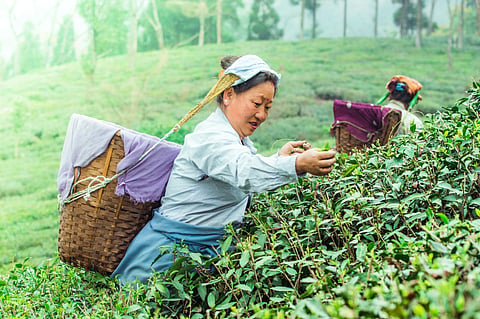
- Destinations
- Experiences
- Stay
- What's new
- Editor’s Picks
- Responsible Tourism
- CampaignsCampaigns
- Subscribe

"The tea estate is always buzzing with some or other activity. The tourists who stay here never feel bored," Nayan Lama, the homestay facilitator of Makaibari—one of the oldest tea gardens in Darjeeling—tells me whilst talking about how the tea pluckers of the estate have taken the reins of tourism into their own hands.
"The [former owner] Rajah Banerjee initially took the initiative to set up homestays in the tea estate in the 1990s. But it wasn't successful then due to the lack of workforce. From 2008 onwards, after the 'Volunteer in Makaibari' project came into action, the homestay programme became successful, and we saw an influx of tourists. Today, there are fourteen homestays here," he says.
Volunteer in Makaibari is an independent self-help group managed by a group of Makaibari's youth wing, which Nayan spearheads.
Located in the Kurseong subdivision of the Darjeeling district of West Bengal, the Makaibari tea estate was founded in 1852 by Captain Samler, an agent of the Darjeeling Tea Company. He later sold the plantation to Girish Chandra Banerjee. Since the 1970s, Makaibari was led by the fourth-generation planter and researcher, tea planter, environmentalist and writer Swaraj Kumar Banerjee, or Rajah Banerjee. Under his guardianship, Makaibari transformed into an organic and bio-dynamic estate.
Rajah left Makaibari in 2017, handing over the reins to Rudra Chatterjee. In 2018, he announced that he would gift his 12 per cent shares in the Makaibari Tea and Trading Company to the estate workers.
Tucked in the foothills of the Himalayas, homestays in Makaibari today are run mainly by the tea pluckers of the estate. And 62-year-old retired government servant Indra Kumar Lama and his wife Meera Tamang are among them. "I set up a homestay in 2003, but it was only after 2008 that business improved. Earlier, the standard of housing was also inferior since I had only one room, where a maximum of two people could stay. But I have managed to add two more rooms now. I have added electronic appliances like geysers also," says Indra, whose mother and many other relatives have worked as tea pluckers.
"Most of the tourists who come here are foreigners. We offer them home-cooked meals that reflect the local cuisine of this area. And we try our best to make them feel at home," adds Meera.
So what can one expect when visiting Makaibari "Tourists can expect to experience a typical village life during their stay here. Our itinerary usually lasts for three nights and four days," mentions Nayan. "They can also partake in tea picking, visit the factory to see how tea is manufactured and processed, indulge in tea tasting, interact with locals to understand more about their lives, go on village treks, forest walk, and birdwatching trips." It is worth mentioning that the area is home to more than 200 species of birds, including the Himalayan bulbul, crimson-breasted woodpecker, scarlet finch, rufous-necked hornbill, fire-tailed sunbird, and the yellow-breasted greenfinch.
Nayan also stressed that earlier, when tourism was not so developed in Makaibari, the standard of living of the locals was poor. "Since tourists have started visiting the estate and living in the homestays, they have started to keep their surroundings clean and have adopted hygienic practices. As they have managed to improve their economic conditions, they have been able to send their kids to study in English-medium schools."
Indra said that he and his wife are hoping to see approximately 20-25 tourists every month in the peak season, which spans from mid-March to June and September last week to Christmas.
"Homestays in Makaibari are completely different from those in Darjeeling, which are, in reality, hotels being marketed under the garb of homestays. We want to invite tourists from India and abroad to visit Makaibari and experience the look and feel of life here."
To reach Makaibari in Darjeeling, you can travel by air to Bagdogra Airport and then hire a taxi or take a shared cab for a 3-4 hour journey to Darjeeling. Alternatively, you can reach New Jalpaiguri (NJP) Railway Station by train and then proceed to Darjeeling by taxi or shared cab, which takes 2-3 hours. If you prefer road travel, drive or hire a car from Siliguri or Bagdogra to reach Darjeeling in approximately 3-4 hours. Once in Darjeeling, Makaibari is only a short distance away, and you can easily navigate to your destination.
